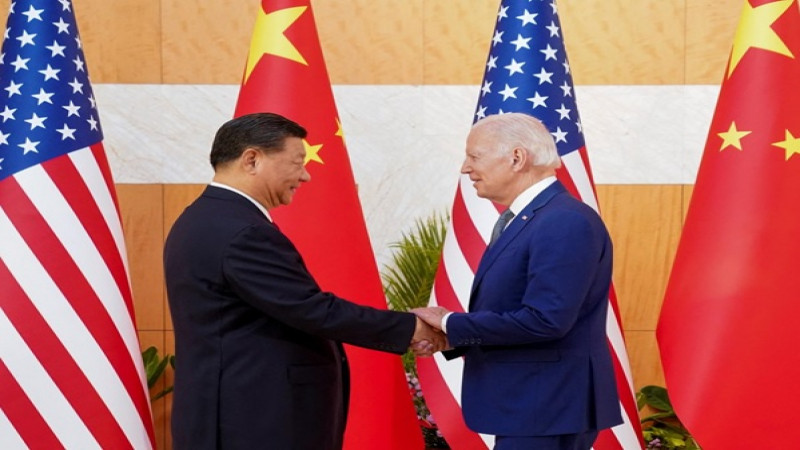Author: Muhammad Asif Noor

The recent summit between President Xi Jinping of China and President Joe Biden of the United States has instigated a momentous transformation in the global economic landscape. In the backdrop of escalating challenges such as war, conflict, and the pressing impacts of climate change, both nations assert their dominance in economics, trade, and investment, intensifying their competitive pursuits. It becomes imperative, against this complex backdrop, to meticulously unravel the economic repercussions stemming from this consequential meeting between two economic giants. The discussions, encompassing a spectrum of issues ranging from trade and technology to climate change, carry profound consequences for the intricate tapestry of economic relations weaving these nations together. As the world confronts these developments, an in-depth examination of the multifaceted economic dimensions arising from the deliberations becomes paramount.
Both China and the United States hold significant weight in the international trade and economics globally. The talks addressed the imperative of removing trade and investment barriers, underscoring the intention to foster greater economic cooperation. Notably, the commitment to convene a first vice-ministerial level dialogue on trade and commerce in the first quarter of 2024 signifies a concerted effort to facilitate a constructive economic relationship. As both nations grapple with the post-pandemic economic recovery, the prospect of supporting business cooperation between Chinese provinces and U.S. states presents an avenue for mutual economic growth. The emphasis on principles such as mutual respect and cooperation for win-win results reflects an awareness of the shared interests that underpin this economic relationship.
Beyond trade, the summit delved into the broader spectrum of economic considerations, touching upon national security issues in the economic and trade. The acknowledgment of the impact of broadening and politicizing national security concerns on normal trade and investment exchanges highlights the recognition of challenges that extend beyond economic spectrum. The emphasis on establishing boundaries for national security considerations underscores the nuanced nature of economic relations, where security concerns have become intertwined with trade dynamics. Concerns raised by the Chinese Commerce Minister, Wang Wentao, regarding issues such as U.S. semiconductor export controls to China, sanctions affecting Chinese companies, restrictions on bilateral investment, and Section 301 tariff measures, reveal the intricate layers of economic intricacies that demand careful navigation.
Additionally, the summit discussed technological competition and innovation. With discussions on artificial intelligence (AI) and technology-related issues, both countries are recognizing the pivotal role technology plays in shaping the future economic landscape. The cooperative agreements on AI and climate change, marking new milestones apart from traditional trade discussions, hint at a broader understanding of the interconnectedness of economic, technological, and environmental facets. This recognition of the evolving nature of economic dynamics suggests a willingness to adapt to the changing contours of the global economy.
The economic ramifications are not confined to the bilateral relationship alone; they reverberate globally. As China and the United States navigate their economic ties, the world watches, acutely aware that these two nations collectively wield substantial influence on the global economic stage. The decisions made and agreements reached between these economic powerhouses have a cascading effect on international trade, investment patterns, and the overall stability of the global economic order. The implications of the summit are far-reaching, influencing not only the immediate economic trajectories of China and the U.S. but also shaping the broader landscape of international economic relations.
The emphasis on supporting business cooperation between Chinese provinces and U.S. states underscores the recognition that economic ties extend beyond the federal level. By encouraging collaboration at subnational levels, the leaders aim to create a conducive environment for local businesses and industries to thrive. This approach aligns with the intricate web of economic interdependence that characterizes the modern global economy, where regional economic activities play a pivotal role.
Concerns were also raised about semiconductor export controls, sanctions affecting Chinese companies, and restrictions on bilateral investment underscore the complex challenges facing the economic relationship. These issues, often rooted in technology and strategic industries, exemplify the intersection of economic and geopolitical considerations. Resolving such challenges requires nuanced strategies that go beyond conventional trade negotiations, acknowledging the integral role of technology and innovation in the contemporary global economy.
The emphasis on principles of mutual respect, peaceful coexistence, and cooperation for win-win results reflects a commitment to diplomatic solutions in managing economic differences. The recognition that harmonious Sino-U.S. business ties contribute to the growth of U.S. companies operating in China emphasizes the interdependence of the two economies. This interconnectedness extends to sectors like electric vehicles and agriculture, where businesses are adapting their strategies to cater to the needs of the vast Chinese consumer base.
As the leaders work towards a stable and developing China that serves the interests of the United States and the world, the global community observes with anticipation. The Xi-Biden summit is not merely a bilateral event but a pivotal moment with repercussions for the entire international economic order. The commitment to avoid a U.S.-China conflict and the recognition of the mutual benefits of stable relations signify a collective understanding of the importance of cooperative economic endeavors in an interconnected world.
Muhammad Asif Noor - Founder of Friends of BRI Forum and Advisor to Pakistan Research Center, Hebei Normal University, China.